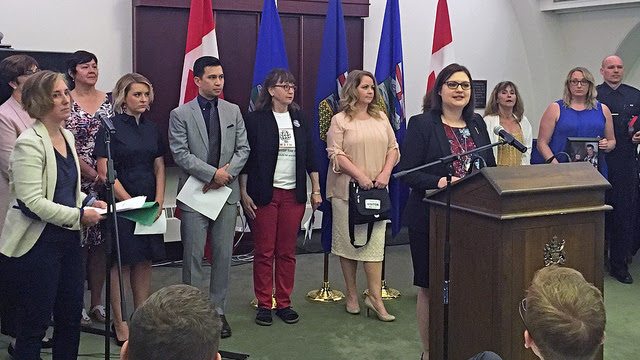The provincial government has declared a public health crisis as the number of deaths from opioid overdoses continues to climb. In response, it’s spending an extra $30 million and setting up a 14 member commission to address the issue.
“Opioid overdoses killed more people last year than motor vehicle collisions and homicides combined,” says Dr. Nicholas Etches, Medical Officer of Health, Calgary Zone, Alberta Health Service.
The 14 member commission will be co-chaired by two doctors, Elaine Hyshka the Scientific Director of the Royal Alexandra Hospital’s Inner City Health and Wellness Program and Karen Grimsrud, Alberta’s Chief Medical Officer of Health. It also includes members from law enforcement, indigenous communities, harm-reduction program experts and parent advocates.
“This dedicated and nimble team will make recommendations and oversee the implementation of new aggressive actions in six key areas: prevention, treatment, harm reduction, collaboration, enforcement and data collection and analysis,” says Associate Minister of Health Brandy Payne.
There will be $30 million in funding for the commission dedicated to respond to the opioid crisis, which comes from the previously allocated $56 million in the Alberta Budget.
The commission will be starting to look at increasing access to treatment, which includes opioid replacement therapy with the drugs Suboxone and methadone. Minister Payne says the cost of the prescription alone can be a barrier for people.
Another priority is creating supervised consumption services as part of a harm reduction strategy.
“Harm reduction recognizes some individuals are not always in the position simply to stop using substances, even when they are putting themselves at risk. Harm reduction also recognizes that all Albertans deserve access to health and social support to assist them in living safer and healthier lives,” says Karen Grimsrud, Alberta’s Chief Medical Officer of Health.
Plans have been put into place for these in a few locations, but they are awaiting federal approval.
“To be frank, I would’ve liked to have gotten the approval for those yesterday,” says Minister Payne.
“I don’t believe those approvals can come quickly enough and our office is in continuous contact with Health Canada reminding them of the urgency here in Alberta.”
Minister Payne clarifies that these sites will not carry illegal drugs.
“They would simply be a place where someone could go to safely use a drug they previously have purchased.” She adds that people would be given advice on how to safely use drugs, as well as being surrounded by medical support in case of an overdose. Information on recovery options such as opioid replacement therapy will also be available at these sites.
The commission will will provide recommendations on funding for these services.
Other harm reduction strategies include providing clean needles, housing support and addiction services.
Steps have already been taken to react to the crisis including a new opioid-dependency program in Grande Prairie that opened earlier this week. It will provide treatment and counselling services to approximately 300 patients. As well, an opioid-dependency program in central Alberta in April to treat patients in Wetaskiwin, Rocky Mountain House, Stettler and Ponoka through tele-mental health programming.
“Ultimately we hope to open more clinics in under serviced areas of the province and making it easier for individuals to get Suboxone and methadone treatment is a top priority as we look to expand public coverage of these drugs,” says Minister Payne.
Other steps taken include allowing first responders to administer naloxone when responding to an overdose and making naloxone kits publicly available. So far over 17, 000 naloxone kits have been dispensed.
Dr. Grimsrud says that reports from community members say that these kits have save approximately 1, 000 lives but she believes that number could be short of the actual amount as not all cases are reported.
“Last year 363 Albertans died from an apparent overdose related to fentanyl, another 113 people died in the first three months of this year,” says Minster Payne.
“These aren’t statistics, they are people dying everyday in Alberta,” adds Dr. Grimsrud.


